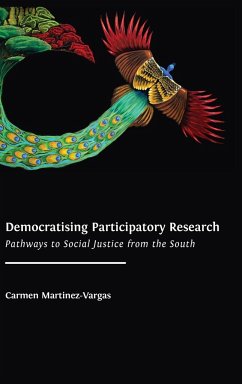In this book Carmen Martinez-Vargas explores how academic participatory research and the way it is carried out can contribute to more, or less, social justice. Adopting theoretical and empirical approaches, and addressing multiple complex, intersectional issues, this book offers inspiration for scholars and practitioners to open up alternative pathways to social justice, viewed through a Global South lens. Martinez-Vargas examines the colonial roots of research and emphasises the importance of problematising current practices and limitations in order to establish more just and democratic participatory research practices. Although practitioners have been challenging the Western roots of research and participatory research for decades, their goals can be compromised by pluralities and contradictions in the field. This book aims not to replicate past participatory research approaches, but to offer an innovative theoretical foundation-the Capabilities Approach-and an innovative participatory practice called 'Democratic Capabilities Research'. Democratising Participatory Research is not only timely and relevant in South Africa, but also in the Global North owing to the current crisis of values jeopardising the peaceful existence of diverse societies. The book gives essential recommendations for capabilities and human development scholars to reframe their perspectives and uses of the Capabilities Approach, as well as for participatory practitioners to critically reflect on their practices and their often limited conceptualisation of participation.
Hinweis: Dieser Artikel kann nur an eine deutsche Lieferadresse ausgeliefert werden.
Hinweis: Dieser Artikel kann nur an eine deutsche Lieferadresse ausgeliefert werden.








